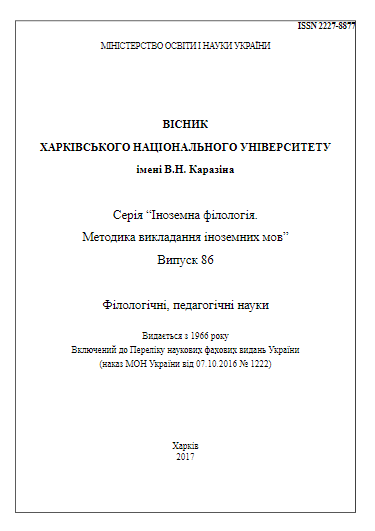Structural and semantic types of warning utterances in the German dialogical discourse
Abstract
The article uses the material of modern German-speaking dialogical discourse to define the structural and semantic ways of expressing the speech acts of warning, taking into account its hybrid nature. The speech act of warning is a hybrid illocutionary type, which is characterized by the simultaneous realization of two illocutions – assertive and directive. These illocutions are related at the level of propositional content: the directive component is the motivation of the addressee to a specific action in the interests, and the assertive component is the reporting of a certain state of affairs relevant to the action predicted in the motivation. By the criterion of the language expression the speech acts of warning demonstrate two types – explicit and implicit. Explicit speech acts of warning occur when: 1) the assertive and directive components are explicitly expressed; 2) the warning illocution is expressed by the explicit performative formula of the type Ich warne dich. The implicit speech act of warning has three types – with an implicitly expressed directive component, with an implicitly expressed directive component and with implicitly expressed both components. Eleven structural and semantic models of the speech acts of warning are established in the German dialogical discourse, among which three are explicit utterances and eight are implicit. The most common means of expressing the speech acts of warning in the German dialogical discourse are the performative formula, the conjunctions sonst and denn, conditional sentence with the wenn conjunction, utterances of imperative structure and modal verbs.
Downloads
References
Безугла Л.Р. Когнітивно-прагматичні характеристики імпліцитних смислів у німецькомовному дискурсі : дис. … доктора філол. наук : спец. 10.02.04 «Германські мови» / Л.Р. Безугла. – Харків, 2008. – 570 с.
Безуглая Л.Р. Прагмалингвистическая концепция И.П. Сусова: Послесловие / Л.Р. Безуглая // Сусов И.П. Лингвистическая прагматика. – Винница : Нова кныга, 2009. – С. 249–260.
Буренко Т.М. Когнітивно-прагматичні характеристики мовленнєвого акту вибачення в англомовному дискурсі XVI-XXI століть : автореф. дис. … канд. філол. наук : спец. 10.02.04 «Германські мови» / Т.М. Буренко. – Харків, 2008. – 20 с.
Вежбицка А. Речевые акты / Анна Вежбицка // Новое в зарубежной лингвистике. – М. : Прогресс, 1985. – Вып. 16. – С. 251–275.
Гриценко М.І. Дискурсивні властивості директивних модальних часток сучасної німецької мови : автореф. дис. … канд. філол. наук : спец. 10.02.04 «Германські мови» / М.І. Гриценко. – Харків, 2009. – 20 с.
Дейк Т.А. ван. Вопросы прагматики текста / Т. ван Дейк // Новое в зарубежной лингвистике. – М. : Прогресс, 1978. – Вып. 8. – С. 259–336.
Добрушина Н.Р. Грамматические формы и конструкции со значением опасения и предостережения / Н.Р. Добрушина // Вопросы языкознания. – 2006. – № 2. – С. 28–67.
Дяків Х.Ю. Мовленнєвий жанр «застереження» та засоби його реалізації в українській і німецькій мовах : автореф. дис. … канд. філол. наук : спец. 10.02.17 «Порівняльно-історичне і типологічне мовознавство» / Х.Ю. Дяків. – Київ, 2012. – 20 с.
Клименко Ю.В. Метамови опису комунікативного акту попередження / Ю.В. Клименко // Вістник ХНУ ім. В. Н. Каразіна. – 2006. – № 741. – C. 90–92.
Козловский В.В. Конъюнктив и выражение модального значения "ИРРЕАЛЬНОСТЬ" (на материале простого предложения современного немецкого языка) / В.В. Козловский // Вісник ХНУ імені В. Н. Каразіна. – 2004. – № 635. – С. 84–88.
Конрад Р. Вопросительные предложения как косвенные речевые акты / Р. Конрад // Новое в зарубежной лингвистике. – М. : Прогресс, 1985. – Вып. 16. – С. 349–383.
Крупкіна Т.В. Застереження як гібридний мовленнєвий акт / Л.Р. Безугла, Т.В. Крупкіна // Наукові праці Кам’янець-Подільського національного університету імені Івана Огієнка. Філологічні науки. – 2012. – № 29. – С. 35-38.
Мясоєдова С.В. Категорія спонукання і її вираження в непрямих висловленнях сучасної української мови : автореф. дис. … канд. філол. наук : спец. 10.02.01 «Українська мова» / С.В. Мясоєдова. – Харків, 2001. – 19 с.
Сусов И.П. Лингвистическая прагматика / И.П. Сусов. – Винница : Нова кныга, 2009. – 272 с.
Шевченко И.С. Гибридная природа извинения: когнитивно-прагматический анализ / И.С. Шевченко // Жанры речи. – Вып. 6 : Жанры и язык. – Саратов : Наука, 2009. – С. 329–337.
Pérez Hernández L. Illokution and cognition: A Constructional Approach / L. Pérez Hernández. – Universidad de la Rioja : Servicio de Publicaciones, 2001. – 366 p.
Searle J.R. Speech Acts / J.R. Searle ; 27th printing. – Cambridge : CUV, 2005. – 203 p.




